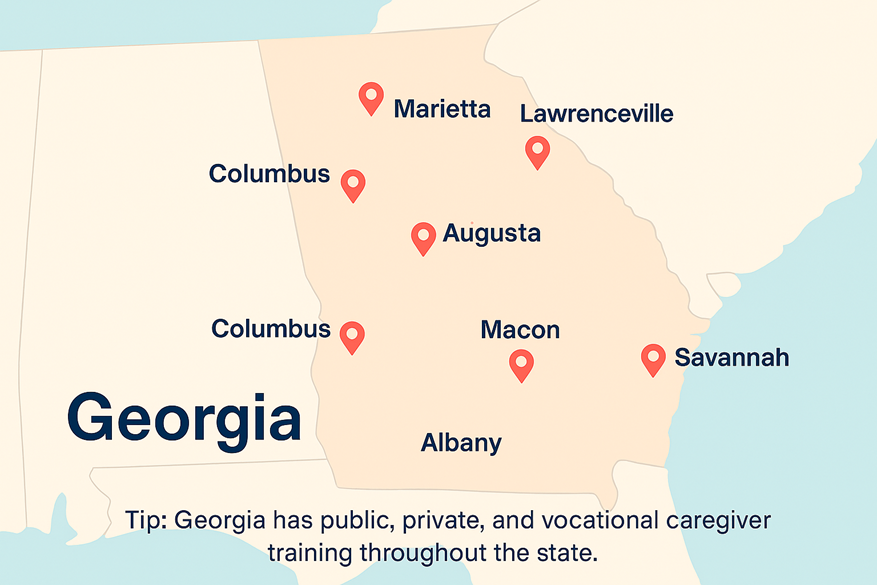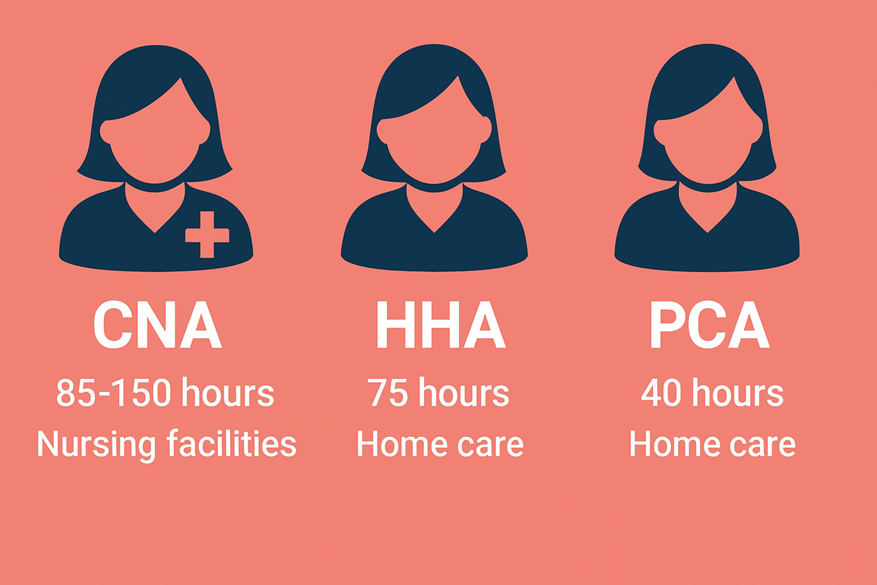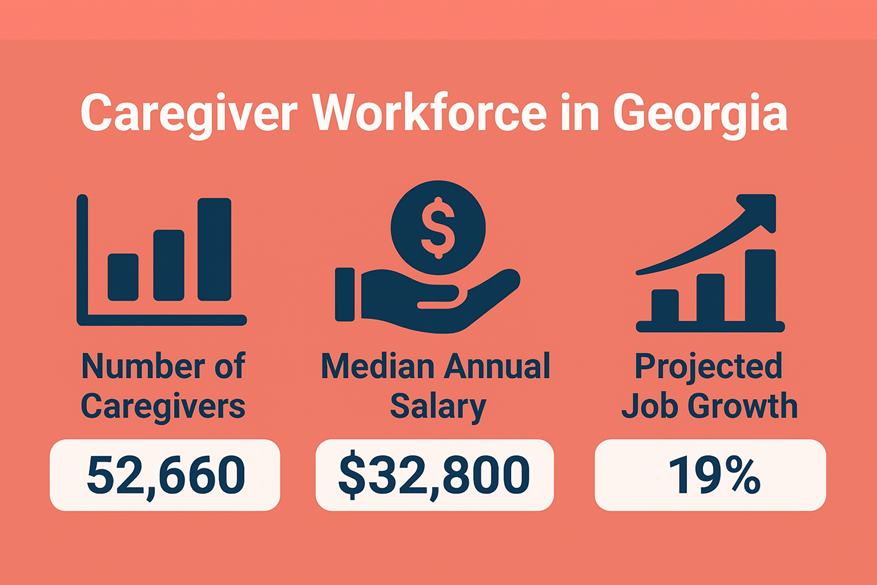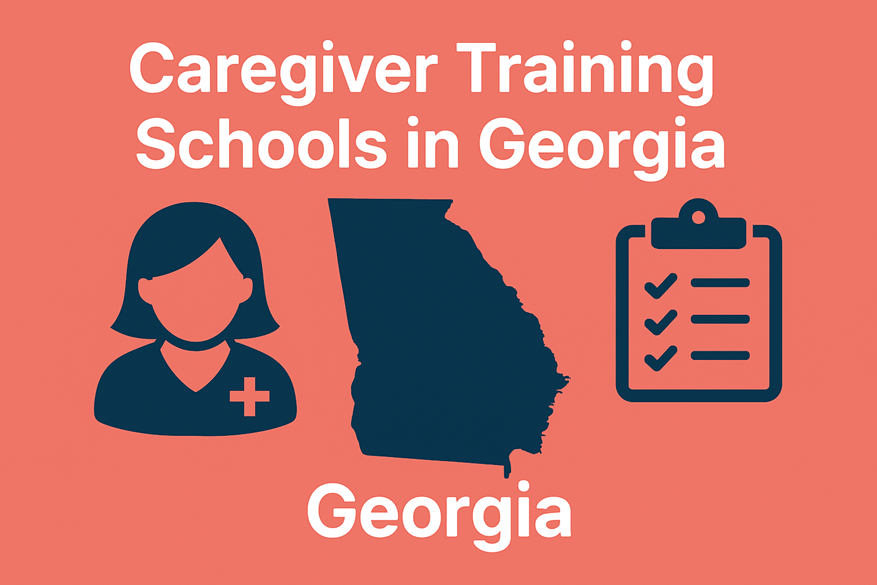Thinking About Becoming a Caregiver in Georgia?
If you’re considering a meaningful career where you make a real difference every day, becoming a Certified Nursing Assistant (CNA) or Home Health Aide (HHA) in Georgia might be your perfect path. Caregivers are the heartbeat of healthcare, supporting older adults, patients with chronic conditions, and those recovering at home or in long-term care facilities.
The best part? You don’t need a college degree to start. With the right training—and a little heart—you can get certified and working in a matter of weeks or months. Whether you’re in Atlanta, Savannah, Augusta, or a small town in between, Georgia offers a wide range of caregiver training options to help you launch this rewarding journey.
Caregiver Training Paths in Georgia

Caregiver training in Georgia typically falls into two categories:
- Public & Private Colleges – Often affiliated with local technical colleges or universities.
- Vocational & Career Schools – Specialize in job-ready programs for fast entry into the workforce.
Let’s break it down further.
Public & Private Colleges in Georgia
These schools tend to offer structured CNA programs through allied health departments. Some include both CNA and Patient Care Technician (PCT) tracks, which may incorporate HHA-related skills. Programs here may be part of a credit-bearing course or continuing education.
Common locations include:
- Technical College System of Georgia (TCSG) campuses like Chattahoochee Tech, Atlanta Tech, and Savannah Tech.
- Private colleges like Herzing University that offer allied health training.
Vocational & Career Schools in Georgia
These are great for students looking for flexible schedules, faster certification, or smaller class sizes. Many offer day, evening, and weekend options. These schools are often found in urban centers like Atlanta, Macon, and Columbus, but also serve rural areas.
Some focus only on CNA training, while others expand into caregiver specialties like dementia care, CPR, or medication assistance.
Public & Private Colleges with CNA/HHA Programs
Vocational & Career Schools with Caregiver Training
CNA vs. HHA in Georgia: What’s the Difference?

Let’s clear up the difference between CNAs and HHAs in Georgia.
Certified Nursing Assistants (CNAs)
- Must complete a state-approved training program (minimum of 85 hours, including 16 clinical hours).
- Pass the Georgia CNA competency exam through Credentia.
- Get listed on the Georgia Nurse Aide Registry.
- Work mostly in nursing homes, assisted living, hospitals, and rehab centers.
Home Health Aides (HHAs)
- Not separately licensed in Georgia unless under a Medicare-certified agency.
- Many HHAs are trained through CNA programs + additional hours by employers.
- Typical HHA roles involve home care—bathing, grooming, meal prep, and companionship.
- Medicare/Medicaid-certified agencies require HHAs to complete at least 75 hours of training with competency evaluation.
Note: Becoming a CNA first opens the door to HHA roles across home care agencies.
Job Market & Salaries in Georgia (as of July 2025)

The demand for caregivers in Georgia is booming—especially in metro areas like Atlanta, as well as retirement hubs like Macon, Augusta, and coastal communities.
According to the U.S. Bureau of Labor Statistics and Georgia Department of Labor:
- CNA average salary in Georgia: $32,800–$38,400/year
- HHA average salary in Georgia: $29,000–$35,000/year
- Top-paying cities: Atlanta, Sandy Springs, Roswell, Savannah, and Athens
- Projected growth (2023–2030): +19% in caregiving-related jobs
Caregiver roles are especially in demand due to Georgia’s aging population, with over 1.7 million residents aged 60 and older.
CNA & HHA Licensing & Certification in Georgia
Here’s how to get certified and start working:
CNA Certification Steps:
- Be 18+ years old (some programs may accept 16+ with parent consent).
- Complete a Georgia state-approved CNA program (85+ hours).
- Pass the CNA exam through Credentia (written + skills test).
- Get listed on the Georgia Nurse Aide Registry.
- Maintain certification by working at least 8 hours every 2 years in a paid CNA role.
HHA Certification (for Medicare agencies):
- Complete at least 75 hours of training, often via CNA programs or HHA-specific courses.
- Meet competency evaluation through employer or agency.
- CPR and First Aid training required (some agencies require TB test and background check).
- Annual in-service training of at least 12 hours if working in Medicare/Medicaid certified settings.
Final Thoughts: Start Your Caregiver Journey Today
Choosing a career as a CNA or HHA isn’t just about job security—it’s about becoming someone’s lifeline. Whether you’re helping an elder client stay independent or supporting a patient in recovery, your work matters every single day.
So if you’ve been thinking about it, this is your sign. Pick a school near you, apply for a class, and take that first step. Georgia’s training programs make it easy to start, and the community really does need more caregivers like you.
Disclaimer
The information above is accurate as of July 2025. However, training requirements, certification processes, and costs may change. Always double-check with the Georgia Department of Community Health, state-approved training programs, and Credentia for the most up-to-date info.
Sources
- Georgia Nurse Aide Registry: https://www.mmis.georgia.gov/portal/
- Credentia CNA Exam Georgia: https://credentia.com/test-takers/nurse-aide/ga
- Georgia Department of Community Health: https://dch.georgia.gov
- U.S. Bureau of Labor Statistics – Nursing Assistants: https://www.bls.gov/ooh/healthcare/nursing-assistants.htm
- Georgia Department of Labor – Wage Explorer: https://dol.georgia.gov
- Premier Medical Careers – HHA/CNA Programs: https://www.premiermedicalcareers.com
- Technical College System of Georgia: https://www.tcsg.edu/nursing/

